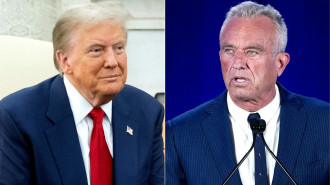China president chooses UAE for first overseas visit since re-election
China's President Xi Jinping will arrive in the UAE on Thursday, as final preparations are made for the high-profile visit to the Gulf state.
The UAE was chosen for Xi's first overseas visit since his re-election as China's president earlier this year, which granted Xi sweeping new powers.
Signs welcoming the president in Chinese and Arabic have been erected on UAE roads, in a visit that has been highly anticipated by local media.
Lights have emblazoned the red flag of China on Dubai's flagships towers of Burj Khalifa and the Burj al-Arab.
Xi will make a three-day tour of the Gulf state, with the much publicised Louvre Abu Dhabi among the sites he will visit, along with a classical performance at Emirates Palace.
Although Emirati media have touted the tour as a step towards deeper UAE and Chinese cultural exchange, the real reason is likely to be economic.
In an op-ed before the visit, President Xi said that "philosophies and policy objectives of our countries are similar".
"Our bonds of cooperation are growing stronger," Xi said, according to Arabian Business.
"China and the UAE have become bosom friends who help and complement each other, and important partners who always communicate and coordinate with each other on regional and international affairs."
China has invested heavily in the UAE's lucrative oil and gas companies over the past few years.
Beijing is also playing a key role in the UAE's expansion of its transport infrastructure and industrial zones, as Abu Dhabi looks to diversify its economy away from oil and gas.
The UAE will also be looking to encourage China's 1.3 billion citizens to visit the Gulf state, and spend in Dubai and Abu Dhabi's array of malls, hotels and restaurants.
Abu Dhabi and Beijing recently agreed visa-free travel for Chinese travellers to the UAE.
Friday's UAE-China Economic Forum will be the focus of investors from the two countries, as Beijing and Abu Dhabi end decades of suspicion and establish warm ties.
But the UAE has played a divisive role in the region, including clashes with some of China's friends.
The UAE and Saudi Arabia have led a blockade on Qatar, with the year-long diplomatic battle causing unease among neutral Gulf states.
Abu Dhabi has also played a key role in the Saudi-led military intervention in Yemen, which has killed thousands of civilians and worsened Gulf relations with China's ally Iran, who back the Houthi rebels in Sanaa.
China has promised a huge investment programme for the Arab world, which has been rocked by years of instability, economic stagnation and war.







 Follow the Middle East's top stories in English at The New Arab on Google News
Follow the Middle East's top stories in English at The New Arab on Google News
![The new film casts Israeli actors to tell the story of Mary while leaving out Palestinians [Getty]](/sites/default/files/styles/image_330x185/public/2024-11/GettyImages-2172155541.jpg?h=199d8c1f&itok=wJWyXDEQ)
![Ben & Jerry's has taken Unilever to court for its alleged attempts to silence it [Getty]](/sites/default/files/styles/image_330x185/public/2024-11/GettyImages-2183900214.jpg?h=199d8c1f&itok=jEcYtQ64)
